‘Disastrous’ but not ‘existential’ for Conservatives
Tim Bale, a professor of politics at Queen Mary University of London, told NBC News that while the results of the election appeared bad — very, very bad — for Sunak’s Conservatives, they did not look like they posed a threat to the party’s existence.
“It’s a great result for Labour and pretty disastrous — though not ‘existential’ — for the Conservatives,” he wrote after exit polls were released but before official results were announced.
“How long it will take them to recover is the big question — especially with Reform snapping at their heels,” Bale added, referring to Trump ally Nigel Farage’s right-wing anti-immigration party.
The U.K. decides: The bigger picture
If you’re just joining us, voters in the U.K. have voted in the country’s parliamentary elections.
This election was fought primarily between the ruling Conservative Party, which has been in government for 14 years, and the opposition Labour Party, which has not won a general election since the days of Tony Blair in 2005.
Every pre-election poll said Labour would win comfortably — with many of them predicting an unprecedented landslide. Before voting opened, some Conservatives were openly conceding defeat. Many voters said they were not being driven by love for Labour, however, but rather by a deep dissatisfaction with the Conservatives.
For many in Britain, the country has long felt stagnant or broken: from the economy and public institutions, like the crumbling National Health Service, to the sewage-filled rivers and the expensive, delay-ridden railways.
Catastrophic night for Rishi Sunak’s Conservatives, polls show
Exit polls indicate a catastrophic election for the Conservatives, who appear to have won the fewest seats in their history, at 131.
In 1906, Conservative leader Arthur Balfour led the party to its lowest-ever total of 156. In the modern era, the 1997 election was the Conservatives’ worst, with 165 seats. These totals date to the foundation of the Conservative Party in 1834.
Labour’s first election was in 1900, and its first few totals of seats were low. Since 1945, it has not dipped below 200 seats.
Exit poll predicts decisive victory for Labour Party, end to 14 years of Conservative rule
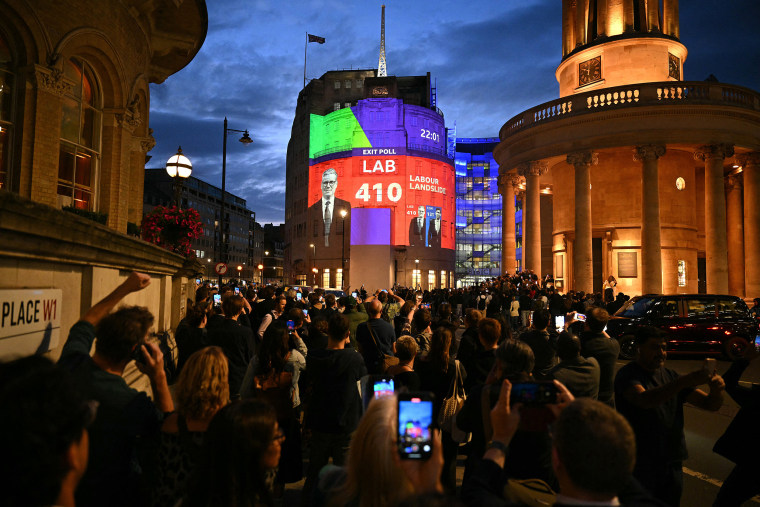
Exit polls are indicating a decisive victory for Britain’s center-left Labour Party, which means Starmer will be prime minister, replacing the Conservatives’ Sunak.
The national exit poll, which is paid for by Britain’s three major broadcasters, the BBC, ITV and Sky, which is owned by NBC News’ parent company, Comcast, is known to be reliable and has given a strong indication of what the final results will be in past elections.
The exit poll is based on a small sample of voters from more than 130 polling stations across the country, with the method engineered by academics David Firth and John Curtice, who is widely regarded as Britain’s top polling expert.
It will be some hours until the final results are revealed — but we’ll be here to provide updates along the way.
How do Britain’s exit polls work?
Once polling stations close at 10 p.m. local time (5 p.m. ET), it’ll be hours before we have the final results — but exit polls should give us a strong indication of how this election will shake out.
Britain’s national exit poll has, for years, been a reliable indicator of the final results in British elections, thanks to the implementation of a polling method engineered by academics David Firth and John Curtice.
Fieldworkers for the U.K.’s exit poll ask thousands of people at more than 130 voting sites across the country to fill out replica ballot papers, with Britain’s three major broadcasters — the BBC, ITV and Sky — paying for the survey and airing its findings once polling stations close. (Sky is owned by NBC News’ parent company, Comcast.)
Ipsos has carried out an exit poll in every U.K. general election since 1997, according to its website — and it says that by “intercepting electors” as they leave dozens of polling stations across Great Britain, pollsters are able to paint a “detailed and high-quality picture of voting trends” that can inform a “highly accurate seat projection.” Still, as Ipsos notes, “no polling method is infallible” and the final results will be the ones to seal the deal on Britain’s future.
Farage poses with pup outside polling station
Right-wing Reform UK party leader Nigel Farage appeared to hop on the #DogsAtPollingStations bandwagon earlier today, posing with a pup outside a voting station.
It’s unlikely that either actually cast a ballot at the polling station, with Farage, who is running to represent Clacton-on-Sea, having voted by post, according to the BBC.
Cats, horses and tortoises — oh, my
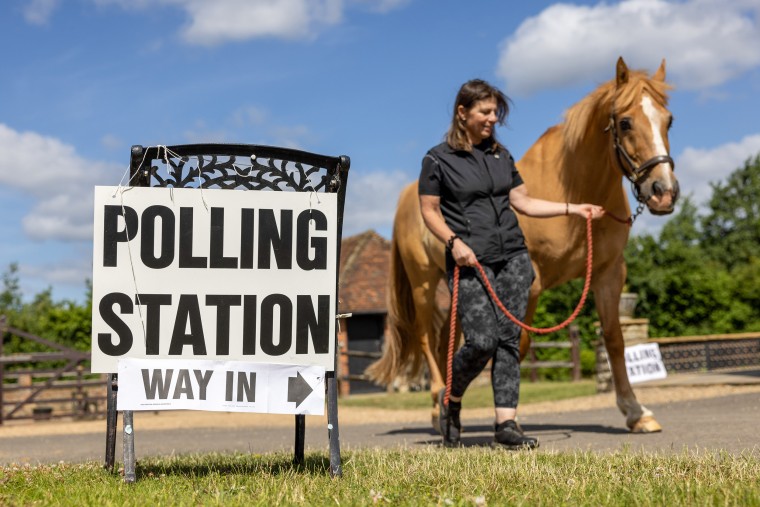
British dogs aren’t the only four-legged creatures hightailing it to polls — cats, horses and even reptiles have been spotted outside polling stations today, with their owners eager to get their beloved pets involved in the democratic action.
One social media user, Amy Hughes, shared a photo on X showing the poster arriving at a polling station on horseback.
“Early to the polling station this morning,” Hughes wrote just before 7:30 a.m. local time, no doubt beating those who made their way on foot with the help of a trusty steed.
#dogsatpollingstations tops U.K. trending list on X
Who let the dogs out?
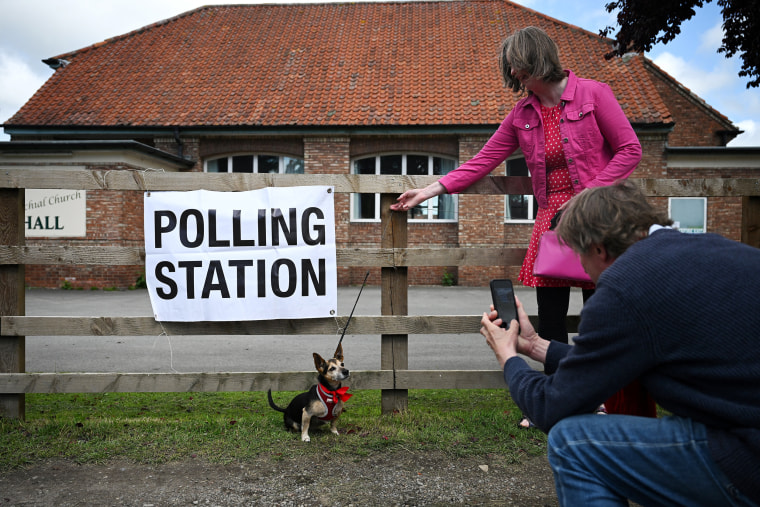
British voters, apparently.
There are 23,800 posts and counting for the U.K.’s top election day hashtag on X, #dogsatpollingstations.
Media outlets in the U.K. are under a strict reporting blackout while voting takes place, with our London bureau among those observing the rules. But until the polls close, the pupperazi are clearly out in full force, delivering election content online.
Knights in shining Starmer: How Sir Keir could make history
If Starmer wins, he would be the first member of Parliament with the title “Sir” to be elected British prime minister since the 1950s.
He received this chivalric royal honor in 2014 in recognition for his work as a human rights lawyer and head of Britain’s government prosecutor’s office. Though Queen Elizabeth II was on the throne at the time, Starmer received his knighthood from then-Prince Charles, who tapped the kneeling lawyer on each shoulder with the flat edge of a sword.
Starmer’s full title is Knight Commander of the Order of the Bath, which was first given by King George I in 1725 and, according to the royal family, dates to medieval times when knights were actual soldiers toting swords and armor. It’s a lofty honorific for Starmer, a man with the most blue-collar upbringing of any candidate in a generation.
Plenty of prime ministers have been knighted since leaving office, but Starmer would be the first MP and leader to already have the title since Anthony Eden, who was knighted in 1954 and became prime minister a year later.
Clear and sunny skies for voters in London
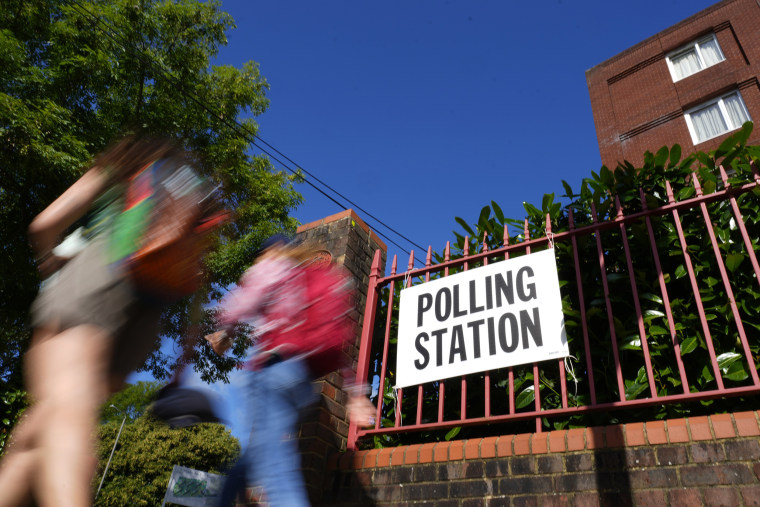
While some parts of the U.K. were expecting rain today, in Britain’s capital, it’s been nothing but clear and sunny skies for voters making their way to London’s polling stations.
Today’s weather stands in stark contrast to Britain’s last general election on Dec. 12, 2019, when temperatures were much cooler and many lining up at polling stations had to endure rain, prompting concerns the dreary weather might affect voter turnout (even if Londoners are used to it).
Still, official figures from the House of Commons library showed voter turnout in 2019 was at 67.3%, down by just 1.5 percentage points compared to the June 2017 election, but higher than the four elections held between 2001 and 2015, with all four held during the months of May and June.
Experts have said they don’t believe there’s a correlation between regular weather and voter turnout. But John Curtice, a top polling expert in the U.K., told NBC News no one should be surprised if voter turnout is “on the low side” for different reasons.
Jargon decoder: What if there’s no majority?
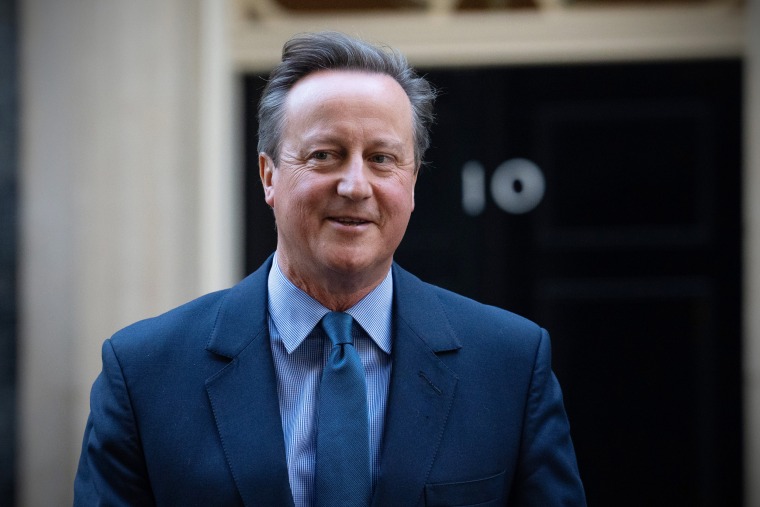
As with any country, the U.K. certainly has its quirks when it comes to its election results, so we’ve put together a dictionary to help you make it through the election. (The first part, defining terms like Blue Wall, Red Wall and the House of Lords, is here.)
First past the post: The name given to the U.K.’s system of selecting members of Parliament (MPs). Voters in each constituency elect one MP, and the person with the most votes wins. With more than two parties likely running in a constituency, wins are often taken with pluralities rather than absolute majorities.
Hung parliament: When an election ends without any party having a majority. This can lead to a coalition or a confidence and supply agreement.
Coalition: When two or more parties form a government because no one party has won a majority of the U.K.’s 650 constituencies. That last happened in 2010, when David Cameron’s Conservatives combined with the Liberal Democrats to evict the Labour Party from Downing Street.
Confidence and supply: Like a coalition but less equal and less formal. A deal struck when one party falls just short of a majority. A small party agrees to back certain policies of a large party in exchange for backing on policies of its own.
Minority government: When a winning party has not won a majority but still chooses to govern without a coalition or a confidence and supply partner.
Why a Labour Party win would be such a rarity
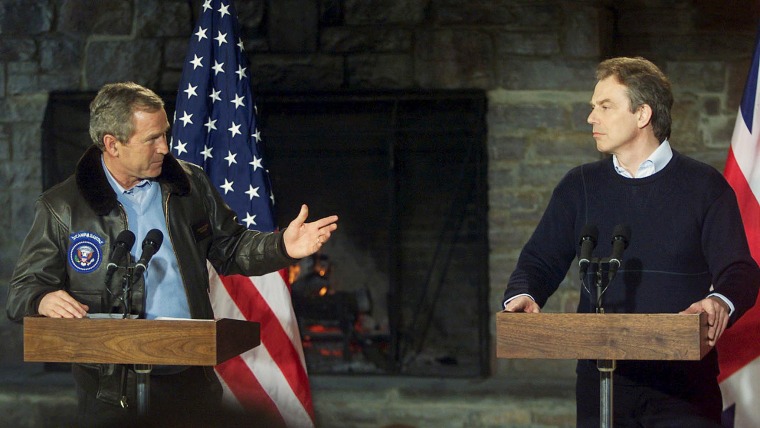
Americans who remember former Prime Minister Tony Blair may think that Labour, the left-of-center party that he led, regularly wins power here. In fact, Blair was Britain’s first Labour prime minister since the 1970s — and the party hasn’t won a single general election since he stood down in 2007.
If Starmer ends that losing streak today, he will become just the fourth man since World War II to defeat the Conservatives. The others: Clement Attlee in 1945, Harold Wilson in 1964 and 1974 and Blair from 1997 to 2005.
The two other Labour prime ministers in that period, James Callaghan and Gordon Brown, both inherited the role but never won elections. Since 2005 Labour has suffered four consecutive defeats, the most recent a historically chastening ballot-box beatdown for then-leader Jeremy Corbyn in 2019.
If Starmer manages to end these 14 years of Conservative rule, he would echo Attlee, Wilson and Blair, all of whom ousted governments that had stood for a decade or more. In all, Labour has governed for just 30 years of its 120-year history. By contrast, the Conservatives’ dominance often fuels their claim to be the most successful force in British political history.
Hong Kong immigrants’ votes could be crucial for Conservatives
HONG KONG — For thousands of Hong Kongers who moved to Britain after Beijing’s crackdown on dissent in the Chinese territory, the election offers a chance to vote again. And in some seats, the fate of Conservative candidates could hang on their votes.
More than 120,000 people from the former British colony have moved to Britain under a bespoke immigration scheme the U.K. introduced in 2021 in response to a national security law imposed by Beijing.
“It is very meaningful for them to participate in democratic elections again,” Ian Ng, a spokesperson for the Vote for Hong Kong 2024 campaign, said in an interview. “Their turnout will not be low,” he added.
Jargon decoder: How Britain votes
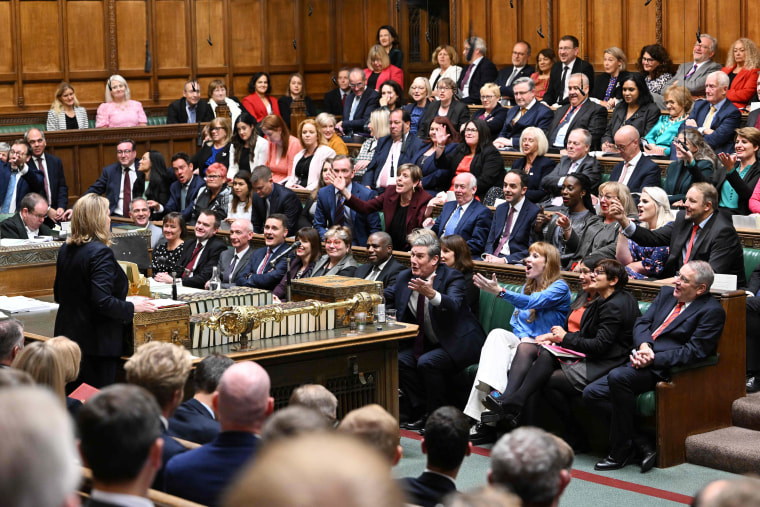
As with any country, the U.K. certainly has its quirks when it comes to its electoral process, so we’ve put together a dictionary to help you make it through the election.
Red Wall: Contrary to the U.S. color-politics system, the left-of-center Labour Party is associated with the the color red. The Red Wall is the often-working class, post-industrial constituencies in England’s north and middle (Midlands). The Conservative Party won many Red Wall seats in the last election.
Blue Wall: The group of constituencies that have traditionally voted for the Conservative Party, which uses the color blue. The constituencies are for the most part in the more affluent, southern part of England. Many are in the commuter belt outside London.
House of Commons: The lower chamber of the U.K. Parliament, where the 650 elected members make the country’s laws. Today’s election is to put MPs into this legislature.
House of Lords: The U.K. Parliament’s upper chamber. Historically made up of “hereditary peers” — the dukes, lords, viscounts and earls who inherited their seat in government — the U.K. abolished the inheritance right in 1999. Its unelected members are now appointed from politics, or other areas like science and the arts. Peers scrutinize the work of the government and recommend legislation changes, and many stay in the job for life.
Constituency: The geographical area in which voters elect one member of Parliament (representative) to represent them in the House of Commons (parliament). The U.K. has 650 constituencies.
Tactical voting: When a voter casts their ballot for a candidate not from their favored party in order to prevent a candidate they dislike from winning.
From laundromats to pubs: Britain’s weirdest polling stations
Every election day, thousands of schools, churches and village halls across the United Kingdom are turned into polling stations. There are around 40,000 of these voting places in all, according to the Electoral Commission, but some are more unusual than others.
Voters in the historic city of Oxford are casting their ballots at the local laundromat, where parties will hope their spin has been effective.
It’s the U.K.’s first parliamentary election to observe voter ID rules.
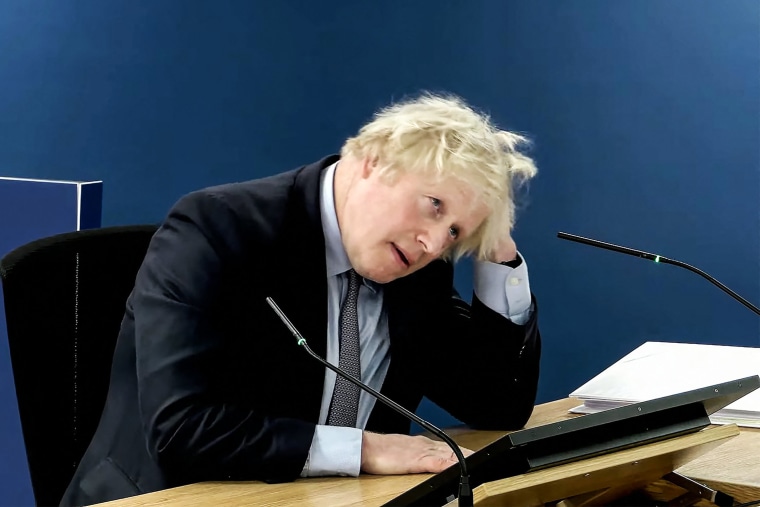
Some voters in the United Kingdom will end up disappointed today — and not necessarily because their party doesn’t win.
The Elections Act, a law introduced in 2022 during former Prime Minister Boris Johnson’s tenure, requires voters to provide photo identification such as a passport or a driver’s license when they go to cast their ballots.
At local elections in May, thousands of voters without the correct identification were turned away.
Among them, ironically, was Johnson himself, who was turned away when he failed to bring his ID to his polling station, but later returned to successfully cast his ballot.
Liberal Democrats leader Ed Davey casts his vote
The leader of the Liberal Democrats cast his ballot at a church hall in his constituency earlier today.
For the uninitiated, the centrist Liberal Democrat Party formed a coalition government with the Conservative Party between 2010 and 2015. It’s also the only major party to support the U.K. rejoining the European Union’s single market, which would roll back a significant element of Brexit.
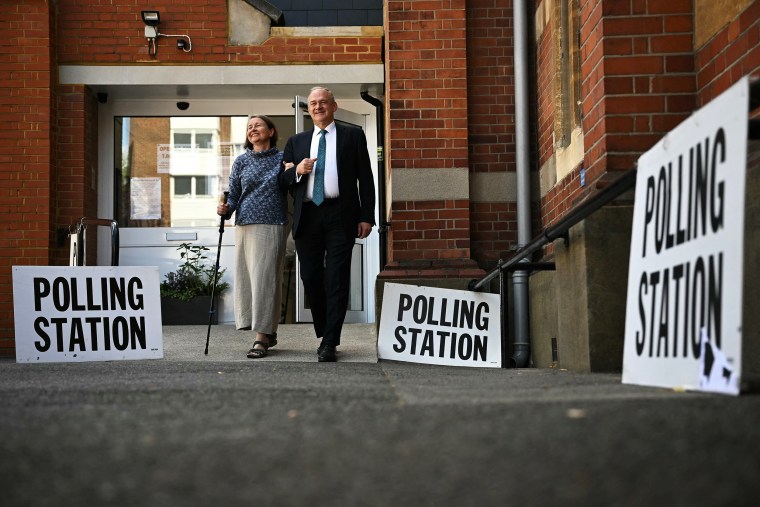
Davey has taken an unusual tack in his campaigning, grabbing what attention he can by undertaking a series of unusual stunts such as paddle-boarding, riding a rollercoaster, attending a zumba class and plummeting toward the ground attached to a bungee chord while screaming, “vote Liberal Democrat.”
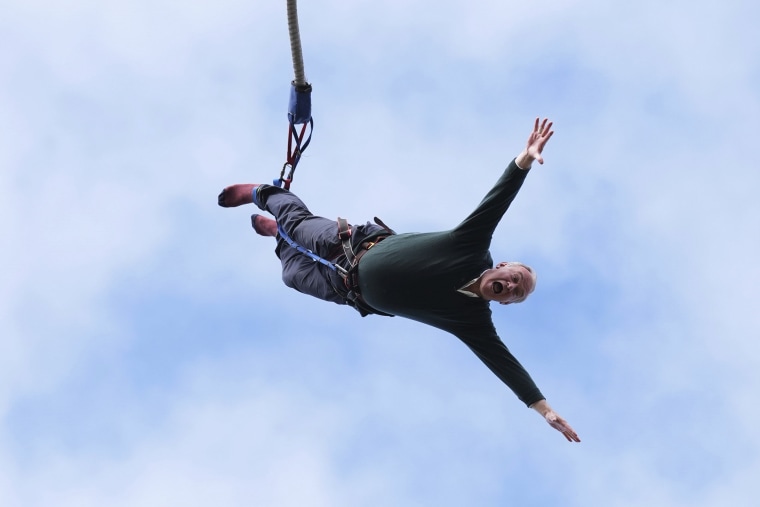

Count Binface, Elmo and AI Steve to run alongside more serious candidates
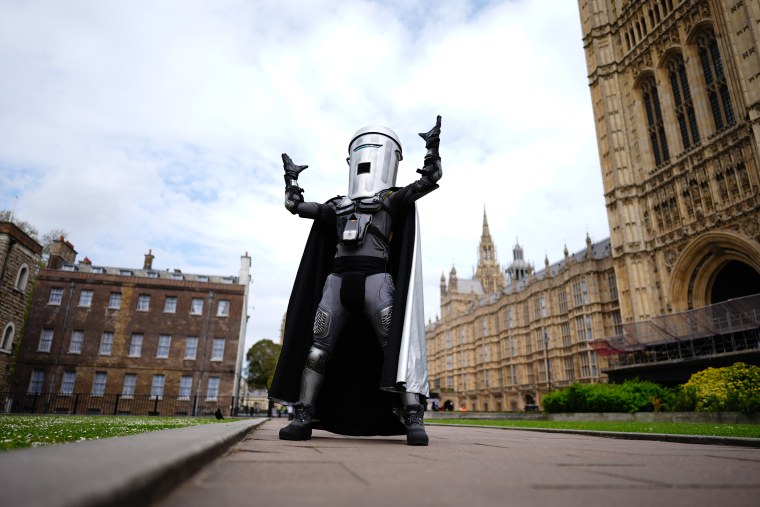
When either Sunak or Starmer takes to the stage to hail victory in the British election tomorrow, they will be joined at their moment of triumph by either a man with a trash can on his head or someone dressed as Elmo from Sesame Street.
Among the more than 4,500 candidates standing for election to Parliament’s 650 seats are those from fringe parties, single-issue campaigners and, in a peculiarly British tradition, those who are simply making fun of the whole thing.
The best-known figure in the latter category is Count Binface, “an intergalactic space warrior, leader of the Recyclons from planet sigma IX,” who will be challenging Sunak in his constituency in northern England.
Dressed in a silver outfit with matching cape and wearing a silver trash can as a helmet, Binface says that he wants to make the election “Bindependence Day” and that he is the “sane” choice for the electorate.
Why Britain has struggled in the past with voter turnout
Reporting from Clacton-On-Sea, England
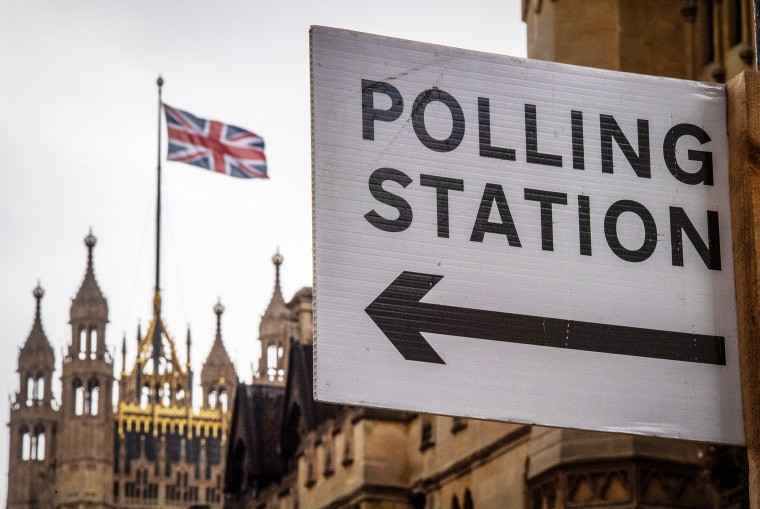
Experts are expecting low voter turnout in today’s U.K. election as many across the country feel increasingly politically homeless — and hopeless about the future.
Just over 67% of people registered to vote in the U.K.’s last general election in 2019 cast their ballots, compared with 68.8% in 2017. John Curtice, one of Britain’s leading polling experts, said he wouldn’t be surprised if voter turnout is “on the low side” again.
“There’s clearly considerable disenchantment for the current government, but there isn’t a lot of enthusiasm for the alternative,” he said.
Paw-licy brief: the U.K.’s affection for election day dogs
With the British press under a strict reporting blackout while voting is taking place, a social media trend has filled the gap in recent years: #dogsatpollingstations.
Open up X or Instagram on any election day in the U.K. and you’ll see proud dog-owners (and the occasional cat-owner) killing two birds with one stone and taking their pooch for a walk while exercising their democratic rights.
Among our favorites is Mungo, whose human is none other than Annie Hill, an NBC News platforms and social media editor based in London.
It’s the economy, stupid! The key issues in Britain’s election.
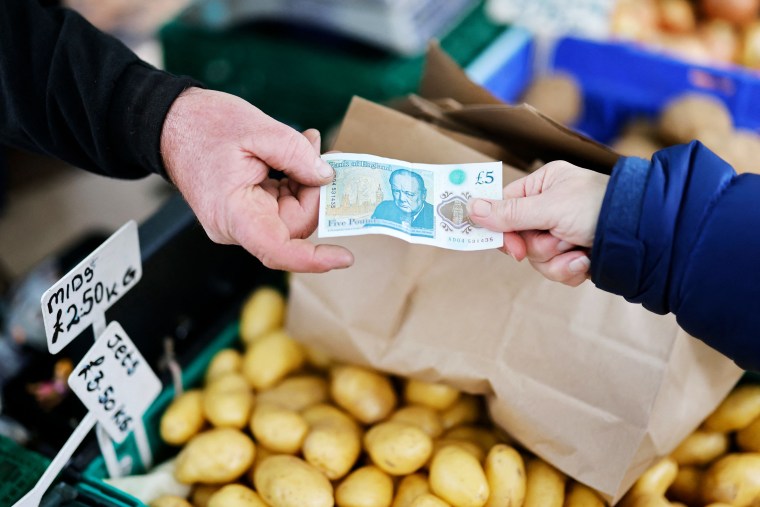
Britain has been mired in a cost-of-living crisis. Real wages have flatlined for a decade — the U.K.’s average salary is 29,669 pounds (about $38,000) — and prices have spiraled for utilities and food. Meanwhile, Britain has the worst rate of homelessness in the developed world, according to the Organization for Economic Cooperation and Development, and 30% of children are growing up in poverty, government figures show.
Rishi Sunak says “brighter days” are ahead after inflation fell back from 11% in 2022 to the target of 2% last month. His party has promised cuts to taxes and public spending, which some economists say are unrealistic given how threadbare budgets already are.
Cautious of the Conservative accusation that it’s irresponsible with the economy, Labour has refused to raise income taxes. Some economists say if Labour wants to boost public services, then some sort of hike may be unavoidable.
Other key issues for voters are the NHS, which is beloved but underfunded and dilapidated, and rising immigration despite post-Brexit promises that this would fall. Meanwhile Sunak has staked much of his manifesto on a controversial plan to deport asylum-seekers to Rwanda, as well as introducing mandatory national service for 18-year-olds.
Firebrand Trump ally runs in down-and-out coastal town
Reporting from Clacton-on-Sea, England
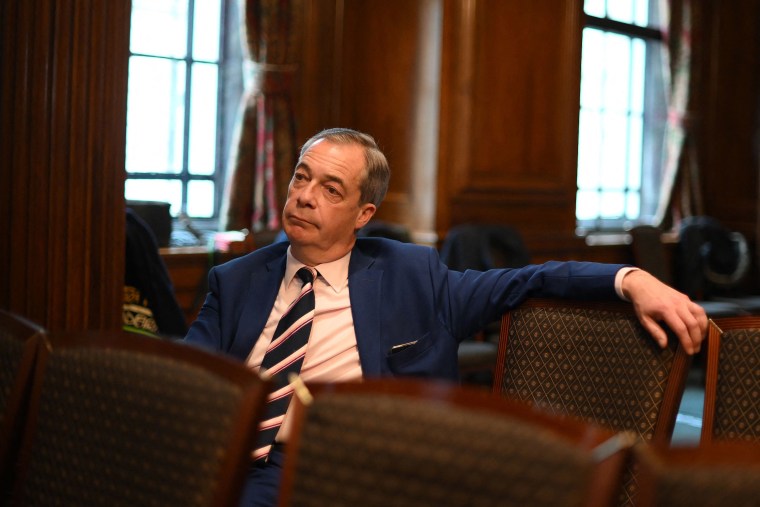
Just a handful of holidaymakers dot the pier of what was once a bustling seaside resort. But change is in the air in Clacton-on-Sea, a sleepy backwater that may become the vanguard for the British right wing if it elects Nigel Farage, a close ally of former President Donald Trump, to Parliament today.
“He hasn’t proven himself, but we’ll give him a chance,” Neville Hurling, 67, said as he sat outside on the patio of the Moon and Starfish Wetherspoon pub last week during a rare mini-heat wave.
Farage, who leads the right-wing Reform UK party and is one of Britain’s most divisive public figures, had celebrated the launch of his campaign from the same pub just days earlier.
Who is Keir Starmer, the self-described socialist making a bid for top office?
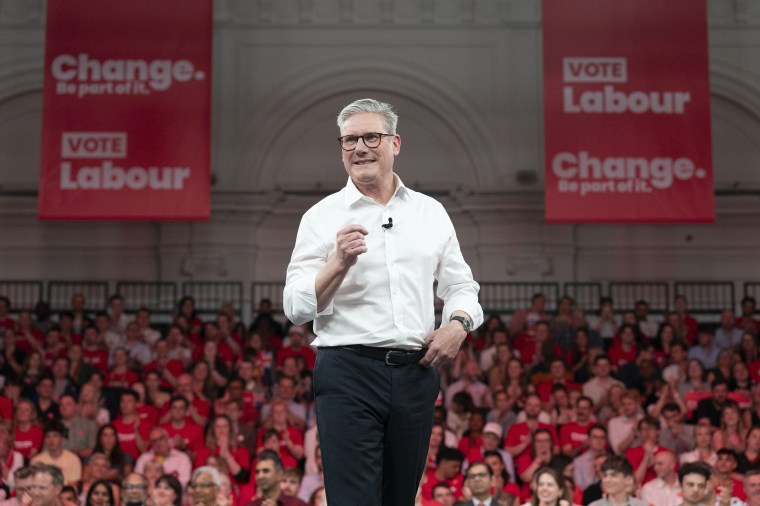
Starmer is running against Sunak, whose Conservative Party has run the country 14 years.
But for a man who could rule this key American ally, the world’s sixth-largest economy, there is little consensus about what kind of leader Starmer, 61, would be or even what kind of man he is.
He has the most blue-collar upbringing of any candidate in a generation while at the same time being the first since the 1950s to already have the title “Sir” after having been knighted by the monarchy. He is a vegetarian and a self-described socialist but also a hate figure for many leftists who accuse him of veering rightward in search of power. And while friends describe him as an affable but hypercompetitive soccer fanatic, in public he often appears stiff and lacking charisma.
Who is British Prime Minister Rishi Sunak?
Reporting from Richmond, England
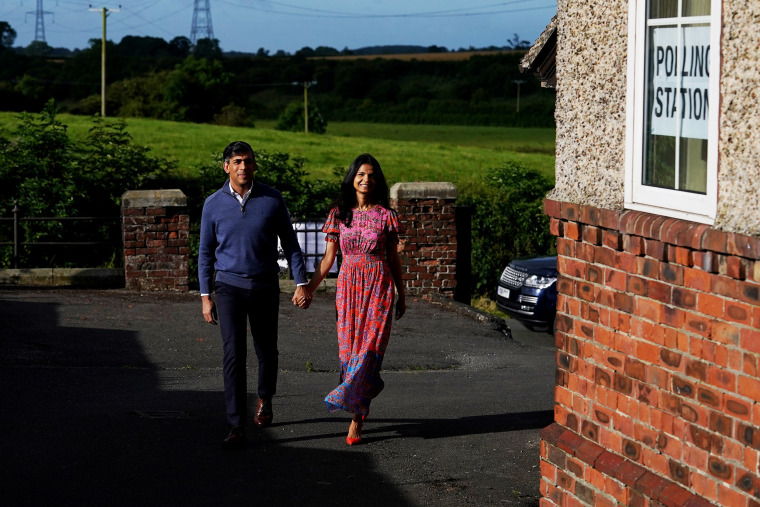
Rishi Sunak has a habit of making history. He’s the United Kingdom’s first British Indian prime minister and its first Hindu leader, and at 42 he was the youngest to take the job in over 200 years. He’s also probably the richest person to govern from No. 10 Downing St.
Now 44, Sunak is about to mark new records in the U.K. general election today.
Hanging over the electorate is a feeling that there is one set of rules for the elites in London — and another for the rest of Britain after years of Conservative Party rule. Living standards are being squeezed. The gap between the very rich and the rest has continued to widen. There is the widespread perception that public services are not just struggling but on the verge of failing.
Broadcasting rules: Why the U.K. regulator tells media to stay quiet during the vote
In an effort to make sure that political coverage is impartial on election day, the U.K.’s state broadcasting regulator, Ofcom, is strict about what media outlets based in Britain can and can’t say while the country’s voting.
Because NBC News’ London bureau is covering the election, we’ll be upholding these rules.
They include avoiding direct discussion of issues, individuals and polling related to the election. While content published before voting began is allowed, outlets aren’t allowed to publish anything new on the day of the vote.
When voting closes, though, the gloves are off.
The British system: How voting works in the U.K.

The U.K. general election is very different from its U.S. equivalent in that the British ballot elects both the executive and the legislature at once. In the states, the president and Congress are voted for separately; in Britain, the whole thing is effectively bundled up together.
The British version isn’t a single vote but rather 650 mini-elections held across the country. The results of those 650 counts won’t be confirmed until the early hours of tomorrow morning, with some tight races or races in remote parts of the country delayed until much later that day.
Each of the 650 mini-elections selects one lawmaker to send to the House of Commons. And if one party manages to get more than half of the members of Parliament, or MPs, it can form a government. That party’s leader, also an MP, usually becomes prime minister, who selects Cabinet members mostly from other elected lawmakers.
If no party wins a majority, coalition negotiations begin.
Britain decides: Upstarts and also-rans
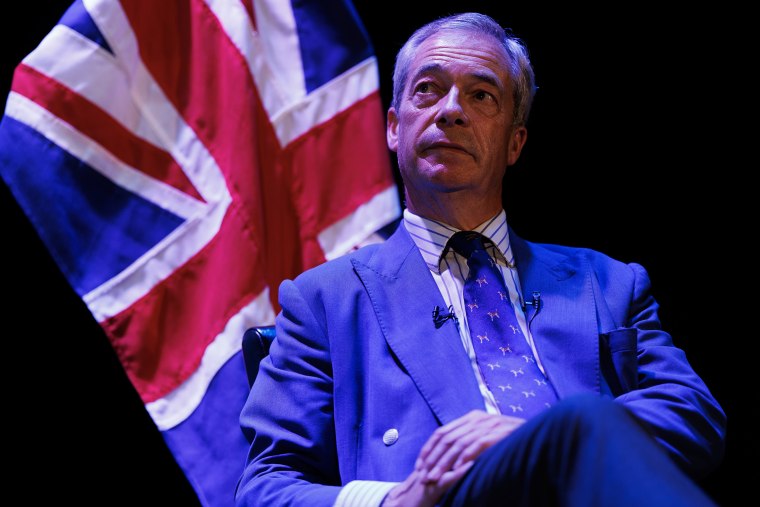
Sunak and Starmer aren’t the only ones competing.
Reform U.K. is a right-wing populist group spearheaded by Donald Trump ally Nigel Farage. The Scottish National Party hopes to hold onto its dominance in Scotland. And Ed Davey’s Liberal Democrats will look to make gains elsewhere. The Greens and Wales’ Plaid Cymru are also fielding candidates and have won single-digit hauls of seats in the past.
Although Britain is often considered a two-party system, these historically smaller groups could be called on to form a coalition if neither the Conservatives nor Labour win enough seats to govern alone. That was the case in 2017, when Conservative leader Theresa May failed to amass enough votes and was forced to enter an informal coalition with the Democratic Unionist Party of Northern Ireland.
Northern Ireland is something of an anomaly in that the mainstream British parties don’t have much of a presence there; in their stead the DUP, Sinn Fein and others are mostly drawn along sectarian lines. No such coalition shenanigans were necessary at the last election in 2019, when Johnson won a convincing majority against Jeremy Corbyn, who led Labour at the time.
The main contenders: In the blue and red corners
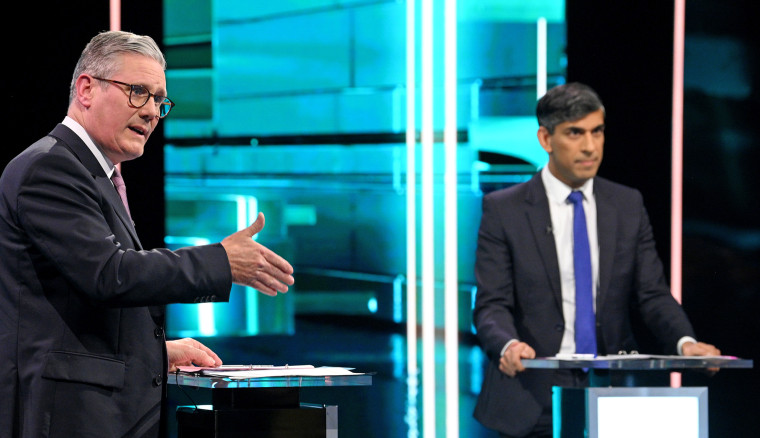
Millions of Britons began voting today in an election principally between the Conservative government of 14 years and its Labour Party opposition. Unlike in the US, the Conservatives, which lean right, are represented by the color blue. Labour, meanwhile, are represented by red — historically the color of the international left-wing movement.
The Conservatives are led by Sunak, 44, who became leader in 2022 without a public vote after his predecessors, Boris Johnson and then Liz Truss, resigned in quick succession.
Labour is headed up by Starmer, 61, a former prosecutor and human rights lawyer who hopes to become the party’s first national leader since Gordon Brown was defeated way back in 2010.
This year, the election is being fought on the battleground of the economy. Britain has stagnated in recent years, battling high inflation and flatlining wages compounded by its acrimonious departure from the European Union. Other big issues, voters say, are the National Health Service, a beloved, publicly funded institution that’s perpetually on the brink of collapse, and immigration.












